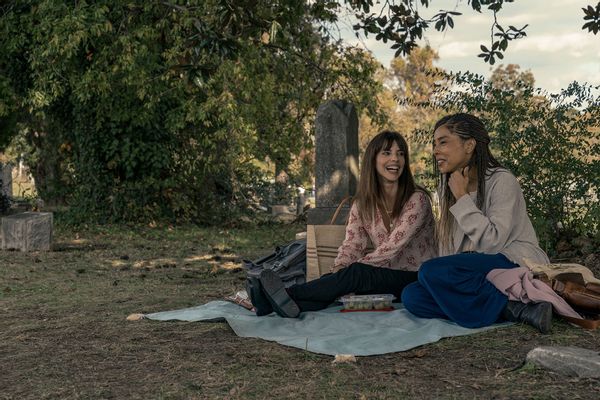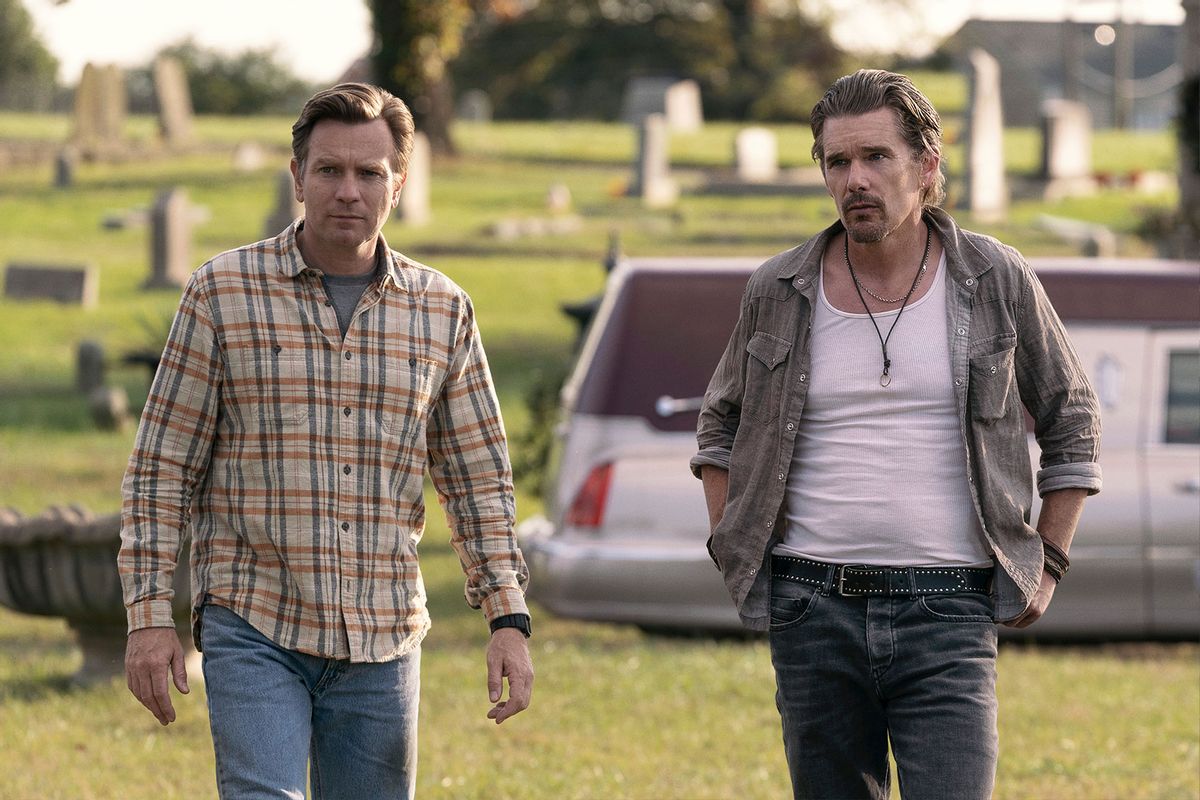Writer/Director Rodrigo García's moving new film, "Raymond & Ray," has its title characters (Ewan McGregor and Ethan Hawke, respectively) attending the funeral of their father, Harris (Tom Bower). Harris was not a good father to either son — he was often abusive to them — but Raymond feels an obligation, and Ray grudgingly goes along. What they discover about their father, and themselves, forms the basis of this melancholic comedy.
García's film is about fathers and sons, and it certainly tackles the thorniness that can estrange children and their parents. Raymond exhibits a more forgiving nature, which is counterbalanced by Ray's bitterness. (McGregor's performance is tightly wound, while Hawke is playful and soulful.) As these adult men accede to their father's last wishes — which includes digging his grave — they come to know who their dad was through other people, including Lucia (Maribel Verdú of "Y Tu Mama Tambien"), his last lover, and Kiera (Sophie Okonedo) his nurse.
Interestingly, the film is shaggy, not somber, full of diverting moments and interesting scenes that reveal much about male pain, regret, fear, and failure. There is also attention paid to objects and rituals in life as well as the people and things that provide everyday pleasure. García infuses his warm film with messages about risk, the power of music, forgiveness and letting go.
García, whose father was the Nobel Prize-winning writer Gabriel García Márquez — and recently published a book about his relationship with his parents, "A Farewell to Gabo and Mercedes" — spoke with Salon about fathers and sons, and his new film, "Raymond & Ray."
I appreciated that you showed Harris to his sons mostly through the eyes of others, rather than through flashbacks. What informed your approach to the storytelling? Your film is almost like a memoir by someone Raymond and Ray (as well as viewers) don't know.
I think Ray and Raymond do know their father well, but from their perspective and according to their own experience. The father was different with every person the way we are different with every person at work, or with friends, or with old friends, even with your spouse or your children. They knew him like they knew him. Raymond and Ray received a version of him that was very tough on them and traumatic, and now they are discovering what he was like out in the world, it makes for conflicted feelings.
Your film is about male pain and fear. These are "grown-ass men whose lives didn't pan out," and the film raises this idea of boys and men not being the same thing. Can you talk about the issues of masculinity presented in "Raymond & Ray"?
We often say, in patriarchal terms, that women are so emotional. No, women are not emotional. They are as emotional as men. Everyone is emotional. Women are often — and I am trying not to generalize — more apt to express emotion, just as many men in our culture, probably for the wrong reasons, are inclined to suppress emotions. To fool themselves about the emotions or not to express them. I think that is poisonous, and the fuel of the story is these men not having fully embraced how they feel. Ray seems to be above it all; it's all about irony. "Screw our dad, I'm over him. He was a jerk." Raymond is more, "Let's forgive; he is a victim himself." But the fact is, they are suppressing feeling. I saw the movie as a journey to letting those feelings flow, and in the case of one of them, they flow with feeling and art and emotion, and in the case of the other, they explode. It is a story of men and their relationship to their own feelings about their dad.
There is a wistful moment — one of many in your film — where Lucia recounts Harris' life in a short but poignant speech. How do you sum up a life, even a fictional one, in such a small moment, speech, or statement?
It is a challenge that always tempts me: How do you sum up a huge thing in a small idea? When Lucia delivers her thoughts on Harris' life, we have so much info on Harris that she can do it in a new light, very briefly. Maribel played Lucia who was very human and very understanding, but also droll and eccentric. She is just so centered and clairvoyant in the way she sees Harris and reduces him to the human that he was — part of something great and at the same time almost nothing at all. I'm very happy with that moment, particularly the humanity and wisdom that Maribel delivers it via Lucia.
 Maribel Verdú and Sophie Okonedo in "Raymond & Ray" (Apple TV+)
Maribel Verdú and Sophie Okonedo in "Raymond & Ray" (Apple TV+)
I like that Harris exercised his power over Raymond and Ray for as long as possible. What are your thoughts about holding on and letting go?
I think you go back and forth on it. You want to forgive, because it is better for you, and as you get older you become more accepting of your parents' humanity; you understand them more. I've been a parent and I know there are days when I have exerted [dis]proportionate anger with my children. We do it, and it's done to us. But I think you have to find a balance. You have to forgive and sometimes you have waves of disappointment or anger at a bad memory, and you should embrace that moment and move on. When there are happy moments, you enjoy them. I don't think you should reduce people to one thing. Even Raymond and Ray, whose father was inarguably a monster to them, was a person well-liked by others. Perhaps he was a monster because he hated himself so much and Ray in particular, touched a nerve because he was a very talented and smart boy. Raymond was a good boy and a pleaser, and that is the kind of thing that can make an angry father angry. Harris' bad behavior probably comes from his own dissatisfaction with himself.
The camerawork in many scenes drew me into the action, but also there was a freewheeling feeling at the gravesite where characters walked in and out of the action. Can you talk about creating emotion through the film's tone and camerawork?
We shot it like a film, so we wanted to have the right balance of close-ups and very wide shots that gave us the idea of people playing these very passionate, painful, personal moments in big spaces and in areas where people are sleeping who have already been through this and they don't care and there you are still fighting it out. I was important to see faces, emotions, and actions played out in everyone's final backyard.
"Raymond & Ray" considers themes of risk, ritual, regret and pleasure. What are your risks, rituals, regrets, and pleasures?
Risks, I don't know if I'm a big risk taker. Creative work is always risky because of the fear of failure. But everything is a risk — marrying someone, having children. You either take the risk or never leave your room, and a house fire could put an end to that plan! Regret, professionally, I wish I started writing and directing sooner. I didn't start until my late 30s. Regrets, I have some in personal area, but I'll leave them out of this conversation. Rituals. Hmm. Pleasures: my daughters' faces, food, nature, my wife, my brother, my parents, my memory of my parents, the usual stuff. And music.
What kind of music?
It depends on the week of the month of the year of the decade. Everything from Miles Davis to corny Latin American love ballads. I'm omnivorous.
Want a daily wrap-up of all the news and commentary Salon has to offer? Subscribe to our morning newsletter, Crash Course.
I was pleased to see some Latinx supporting characters in "Raymond & Ray," but I find it interesting that you have not made a specifically Latinx film. I could easily see this film as having Latinx leads. Do you have intentions of creating a Latinx project?
I have a long history trying to make one! I did direct a pilot that was Latino-themed, a reboot of "Party of Five." I did produce two series in Latin America last year, "Santa Evita," which tells the story of the corpse of Evita Peron, for Hulu, and "News of a Kidnapping," a series in Colombia, for Amazon, based on my father's nonfiction book. But I have projects I wanted to make in the U.S. with Latinx characters and I have not able to. It has been very hard to find funding and distribution. I do have a plan for a movie that I hope to make in Mexico next year, and I hope that will be my first movie in Spanish.
"Raymond & Ray" is available for streaming on Apple TV+ starting Oct. 21. Watch a trailer via YouTube.
Read more
about this topic



Shares